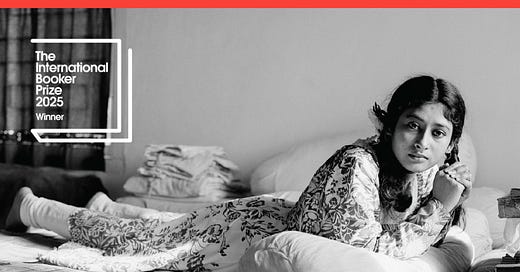Heart Lamp by Banu Mushtaq, translated by Deepa Bhasthi
A voice for the voiceless, winner of the International Booker Prize 2025
There has been a trend over the past few years where Western women authors write revisionist fictional histories where clever heroines rebel against oppressive circumstances, proving their unique individuality can trump societal expectations. These stories sometimes seem to over-reach, projecting modern values onto historical and cultural contexts which may not have borne such philosophies. It is perhaps a form of wish fulfilment to topple a patriarchy in fiction, which in reality would never have been toppled (and still hasn’t toppled).
Lawyer, author and activist Banu Mushtaq is a real life voice of dissent against the violence perpetuated against women in southern India, and yet her fiction has its feet planted firmly on the ground of a suffocatingly rigid reality. Heart Lamp is a collection of stories that seeks to portray the lives of Muslim women and their families in southern India, and take aim at the hypocrisies and fragile egos under which they suffer. The patriarchy is not overturned. Justice is never properly served. The value here is representing these lives of perpetual compromise, and in discovering small moments of gentleness, humour or spirit within them.
The translation of these colloquial, contextual tales is quite extraordinary. Deepa Bhasthi chooses not to italicize or translate many Kannada terms, and leaves the audience to do the work of situating themselves in the atmosphere of each story even if we don’t understand the nuances. It’s like walking into a room where the conversation has already started – you may not pick up every detail but it can feel exciting to join a party in full swing. For example, it took me until halfway through the story ‘Red Lungi’ to work out that ‘khatna’ means ‘circumcision’, and that’s when things really got cooking. The language sings with non-English rhythms that make the text at once intimate and unfamiliar. I felt as though I was peeking through a veil into a totally different world with intricate rules and regulations, and yet the themes of betrayal, selfishness, the unexpectedness of human idiosyncrasy and the fierceness of motherly love are ultimately universal.
In the title story ‘Heart Lamp’ a woman returns to her family of origin in crisis after she learns that her husband is sleeping with a younger nurse and has no intention of hiding it. Instead of being met with empathy, she is blamed and dragged back to her marital home where her brothers happily socialize with the husband who has humiliated her. The story ends with her attempted suicide, interrupted by her pleading children. It sounds unspeakably dark and desperate, and it is certainly bracing to watch these women’s dignity be trampled again and again. But there is something to be said for the transparency of the entitlement of the men in these stories – a laying bear of the harsh reality women are facing without excuse or adornment, just a clear declaration of the irrelevance of their own agency. Mushtaq’s stories are unflinching and gritty and brave. There is no redemption. The act of bearing witness is the only catharsis here.




